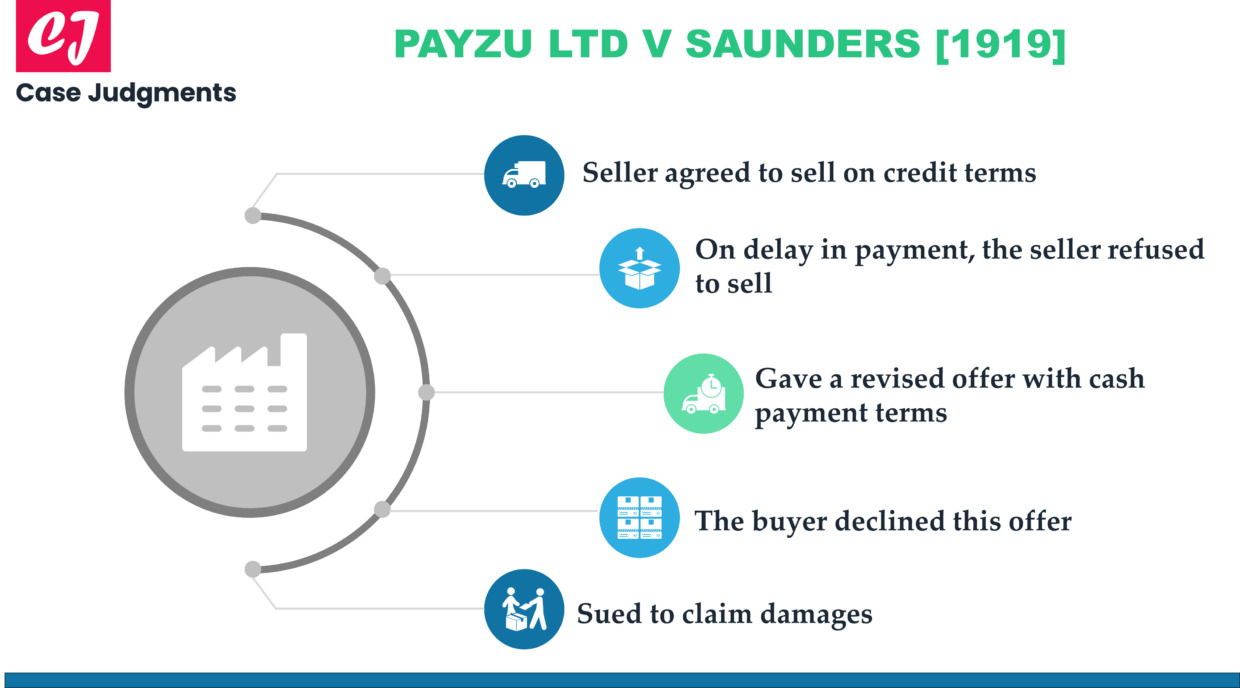
Payzu v Saunders [1919]: A Case Summary
Payzu v Saunders [1919] is a UK contract law case that concerned the question of awarding damages if the claimant fails to mitigate its losses. It did not accept an alternate offer from the defendant sellers who were in breach of contract. Given below are the case details:
| Case name & citation: | Payzu Ltd v Saunders [1919] 2 KB 581 |
| Court and jurisdiction: | The Court of Appeal, England and Wales |
| The bench of judges: | Bankes LJ, Scrutton LJ |
| Area of law: | Remedies for breach of contract; assessment of damages |
Facts of the case (Payzu Ltd v Saunders)
In the instant case, an agreement was reached between a buyer and a seller whereby the seller agreed to sell a fabric known as crêpe de chine. Delivery was supposed to take place in installments over the course of nine months, with payment due within one month of each delivery. Following the first delivery, the buyer failed to make its timely payment.
Mistakenly believing that the buyer’s lack of resources was the cause of non-payment, the seller refused to continue delivering goods under the contract. Instead, they proposed to deliver the goods at the contract price only if the buyer agreed to pay in cash on delivery of each installment. The buyer rejected this offer and ended the contract based on the seller’s repudiation (i.e., refusal to fulfill their contractual obligations). They sued the seller for breach of contract and claimed compensatory damages for the difference between the market price and the contract price (given that the market price of the goods had risen in the meanwhile).
What was the issue?
Could the buyer claim the aforesaid damages for breach of contract?
Judgment of the Court in Payzu Ltd v Saunders
The Court held that the buyer should have accepted the seller’s revised offer and payment terms in order to mitigate its loss. But instead of doing so, it went on to purchase the goods from the market at a higher price. Since it permitted itself to sustain a large measure of loss despite being offered a reasonable option by the seller, it failed to mitigate the loss and hence, was not entitled to damages.
Scrutton LJ stated: “In commercial contracts, it is generally reasonable to accept an offer from the party in default. However, it is always a question of fact.”
Consequently, the amount of damages awarded to the buyer did not rely on the difference between the market price and the contract price. Rather it was limited to the loss that the buyer would have incurred if it had accepted the offer.
The reasoning behind the decision
The rationale behind the decision was to prevent overburdening the defaulting promisor with liabilities. In cases where the promisee has the opportunity to avoid part of his losses by accepting a reasonable offer presented by the promisor, then he is expected to do so. Any residual loss that still exists can be compensated through damages so that the promisee is not left worse off.
Based on the facts, the court determined that the buyer had the financial capacity to pay cash for the goods and that the seller’s offer was genuine. The buyer would have experienced only a minor loss as a result of the less favorable payment terms, for which damages would have been available. Therefore, it should not have allowed itself to bear a substantial amount of loss that could have been reasonably avoided through prudent and reasonable actions.
List of references:
- https://eprints.lse.ac.uk/66282/1/Rowan_Resisting%20termination_2016.pdf
- https://www.lawteacher.net/cases/remedies-cases-1.php
- https://discovery.ucl.ac.uk/id/eprint/1413679/1/Letsas___Saprai-2.pdf
You might also like:
More from contract law:

